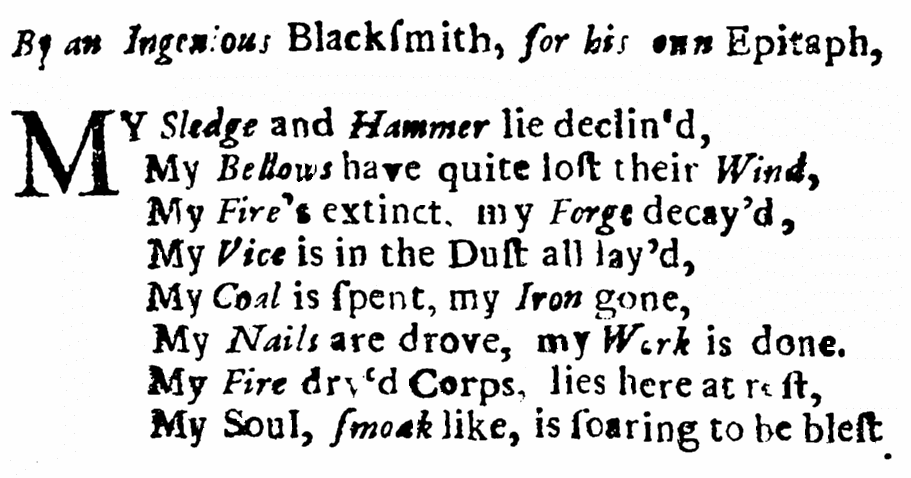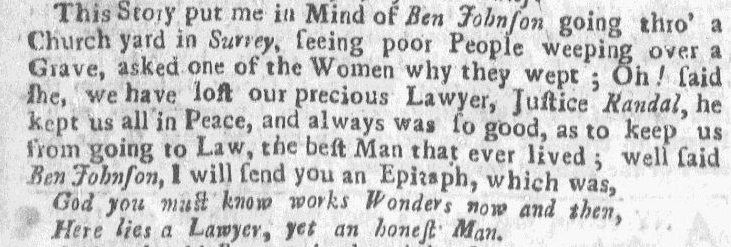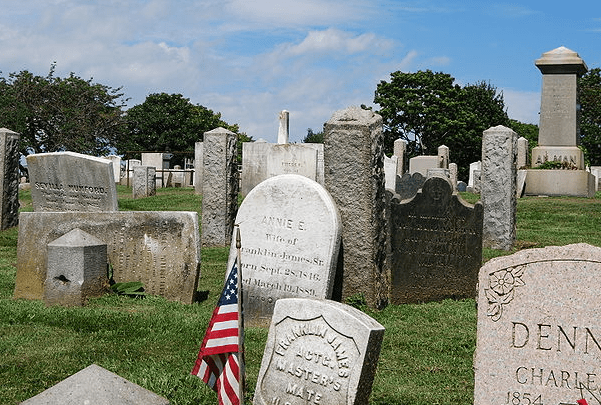Introduction: In this article, Mary Harrell-Sesniak searches old newspapers to find more memorable epitaphs from the 18th century. Mary is a genealogist, author and editor with a strong technology background.
Genealogists take a keen interest in cemeteries, obituaries and epitaphs. Epitaphs can provide glimpses into your ancestors’ personalities – and even when they’re not about anyone in your family tree, epitaphs can still provide humor, insight and entertainment.
I recently wrote the article A Genealogist’s Delight: Epitaphs from the 18th Century. Here are some more 18th century epitaphs I uncovered during my research.
Occupations
Epitaphs for specific trades are common. This ingenious blacksmith, who wrote his own epitaph, noted that his nails were driven and his work was done.

My Nails are drove, my Work is done.
My Fire dry’d Corps, lies here at rest,
My Soul, Smoak like, is soaring to be blest.
Many people perceive lawyers as dishonest. This epitaph commemorates a lawyer who was remembered as a wonder of God – because he was an honest man!

God you must know works Wonders now and then,
Here lies a Lawyer, yet an honest Man.
Wit
As the lawyer’s epitaph above shows, many 18th century epitaphs are quite witty and bring a smile to the reader’s lips.
Although Thomas Sheridan carried the title “Rev. Dr.,” we learn in this epitaph that “Poor Tom” was “more Merry much than Wise.”
Who only liv’d, for two great Ends,
To spend his Cash, and lose his Friends.
His darling Wife, of him bereft,
Is only griev’d——-there’s nothing left.
Then there’s this sly epitaph, which mocked an academic at Oxford who thought the letters he wrote were so very clever.
Tho’ what those Letters shou’d contain,
Did never once disturb his Brain.
Since therefore, Reader, he is gone,
Pray let him not be trod upon.
This next epitaph tells the story of a man who made legal claims to recover the tithes assessed against his farm. He succeeded before he died, and has “since gone to receive the Reward of so Great Merit.”
Happy Man! he purchased Paradise for himself, and Eggs
and Apples for his Successors.
There’s an interesting story to this next epitaph, written for John Oakes. In his will he left a considerable reward of 500 English pounds for anyone who would write an appropriate epitaph for him – the winner to be chosen by Oakes’ executor. Though many tried, the executor (not surprisingly) found none to his liking – so he wrote an epitaph for Oakes himself, and pocketed the 500-pound reward. His “winning” epitaph is a marvel of brevity.
Here lies the body of John Oakes,
Who liv’d and died like other folks.
The editors called this next example a “curious epitaph” for “sturdy Richard,” who had a reputation for honesty.
Whose word no man e’er dar’d deny,
But Death has given him the lye.
Then there is this somewhat bizarre example.
It begins by presenting the straightforward epitaph of John Lettuce, who died at the young age of 21:
All you that come my grave to see,
As I am now, so you must be;
Therefore prepare, make no delay,
For I in my prime was ta’en away.
Then the editors inserted this parody:
John Lettuce complains, and indeed with some reason,
That Death cut him off, ere he came in full season;
Let’s invoke Heaven’s aid, then, to stop such dire ravage,
And grant that in future each Lettuce may Cabbage.
Have you discovered any memorable epitaphs while doing your family history research? If so, please share with us in the comments section below.
Related Articles:
